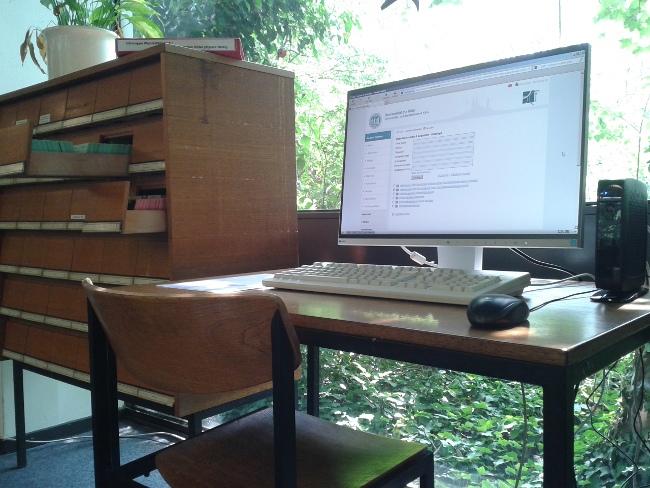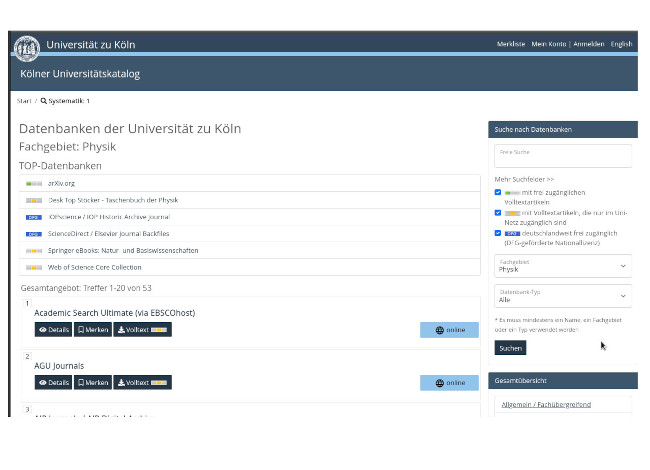You will find our entire collection and all campus-wide e-licenses in the online catalogue of the University and City Library of Cologne (USB).
-
You can filter the USB catalogue to narrow your search to our books, but note that licensed e-books or journals will no longer appear in the results.
-
If you search within the university network (access via VPN), you can access the licensed articles or e-books directly via the publishers’ homepages.
-
You can order books or papers that are not available in Cologne via interlibrary loan.
books & e-books
There are two different locations within the physics institutes where you can find our printed books: “Physikalische Institute / Forschungsbibliothek” (books in the reading room) and “Physikalische Institute / Studierendenbibliothek” (books in the textbook collection sbib).
Feel free to get inspired directly at the shelves to find useful books. Our collections are sorted by subject areas:
In the catalogue, e-books are marked with a blue globe biutton as "online resource", the full text is linked directly in the result list. This link leads to the corresponding (external) publisher's page.
The terms of use (DRM) of individual titles and publishers vary quite widely: sometimes you can download the whole book as pdf, sometimes you can only read the content online. Some books are only provided by suppliers like ProQuest, which require prior registration.
The university library summarises the characteristics of ebook providers on its website.
note: It can sometimes take some time for new ebooks to be listed in the online catalogue even though you can already access the content on the publisher's website. Therefore, also check the webpages of these publishers (remember to log into the university network)
journals, licenses & scientific papers
You can specifically search for scientific papers in the USB-catalogue. Please note the 2nd tab "articles & more" in the list of results. You will find the link in the detailed information on the title.
All journal holdings (print and online) are listed in the USB catalogue; you can narrow the results in the 1st tab "Books & more" to the Type of media "Zeitschrift/Serie" (journal) to quickly find the journal you are looking for.
If you are looking exclusively for e-journals, simply use the corresponding button on the homepage. You can then use the list on the left to get a subject-specific overview or enter a specific title in the search slot on the right.
Attention: sometimes you cannot access licensed content via your VPN due to legal restrictions.
The German Union Catalogue of Serials (ZDB) lists all journals in printed or electronic form that are available in German and Austrian libraries.
We store our (especially older) journals in two archive rooms in the basement and in the journal room of the library. You will find the current issues on the shelf right by the door to the CIP where you will also find a list of our printed journals.
more digital services (databases / repositories / podcasts & videos)
You can use the USB catalogue to get an overview of all licenced databases and electronic media; alternatively, the Database Information System (DBIS) provides a similar summery (in German only).
document servers:
- arXiv.org is a free distribution service and an open-access archive for scholarly articles in the fields of physics, mathematics, computer science, quantitative biology, quantitative finance, statistics, electrical engineering and systems science, and economics. Materials on this site are not peer-reviewed by arXiv.
- At the end of 2013, the bioRxiv was founded - a free online archive and distribution service for unpublished preprints in the life sciences.
publications from major research institutions:
- On the CERN Document Server you will find multimedia publications of CERN in the field of HEP.
- The scientific publications from Forschungszentrum Jülich are recorded in their publication portal JuSER.
- The SAO/NASA Astrophysics Data System (ADS) is a digital library portal for astronomy and physics operated by the Smithsonian Astrophysical Observatory (SAO) with funding from NASA; it contains more than 15 million records of publications in astronomy and astrophysics, physics, and general science, including all arXiv e-prints.
popular science resources:
- On youtube you will find top-class physical societies that offer their lectures and event recordings in their own channels, e.g. youtube channel of the DPG (mostly in German)
- Many lectures and talks can also be found in the TIB AV-Portal. These videos cover topics such as computer visualizations, simulations, experiments, interviews, lecture and conference recordings, and (open) audiovisual learning and teaching materials.
Please contact Ms. Graffenberger if you do not have access to (licenced) content or if you cannot find the article you are looking for.
1) clarify and describe the information you need
define the type and quantity of information and sources:
- What do you need the information for (term paper, exam preparation, introduction to the topic, scientific paper)?
- What level should the results have? Wikipedia entry for a first impression, textbook, reference book, current scientific paper?
- What languages can you consider? Remember that in physics, English is the predominant language (especially for current topics and research results).
- What types of media should be considered? Online resources/ internet sources, books which are available in the physics library, journal articles, conference papers?
2) information retrieval strategies
- collect keywords and synonyms; maybe you can create a mind map to understand context and connections
- if you do not get any matching results when you search for your technical terms, use more general keywords. Maybe you can find new keywords from these search results. Or vice versa: start searching with more general terms and use the results to refine your search
- "Pearl growing" (or "snowballing") is an effective approach to search for literature systematically: if you already know a relevant paper / book, you can use the references cited in that paper. Have a look at the references of the references and so on. Attention: you will only find souces which are older than the original paper.
- Some databases, e.g. the "Web of Science", offer the function "cited references" - a kind of snowball into the future. This lists articles that have cited the original paper at a later date. This helps to search for newer literature, but also does not show the latest publications on a topic.
- It may be worth subscribing to news feeds and alert services of certain publishers/journals or organisations if you are working on a long-term research project.
- networking: ask your fellow researchers for book recommendations or interesting papers
3) gather information and evaluate sources
| source of information | evaluation | annotation |
| google is great for research if you know how to use it: find the right keywords, filters and search operators, e.g. "define:", "filetype:" or "related:", you can use the "any time" filter to limit results to a specific time period, etc. | If you are lucky, you can access scientific documents directly via "Google Scholar" (especially from the university network, when various licenses apply); you will definitely find literature references which you can look up in library catalogues remember: google scholar also shows / links results behind paywalls Alternatively, you can use BASE (Bielefeld Academic Search Engine). It is one of the world's largest search engines for scientific documents, including articles from repositories. Most of the documents are open access full text. The BASE search engine is operated by Bielefeld University Library. | |
| wikipedia | good to become acquainted with a new topic, but you should not use it as a reference. You might also look out for articles in other “languages" (navigation on the left), maybe you will get further information there | however, you can use (and cite) the sources you find at the end of every article, such as "see also", "bibliography", "references" or "external links" |
| youtube-tutorials | if you prefer watching videos to reading, you can find helpful tutorials on youtube; however, check in advance whether the author is trustworthy! Many institutions such as DLR or DPG now operate their own channels. | the lecture recordings from the Corona period are still available on various platforms (vimeo, ilias, sciebo) and are very beneficial |
| journal article | An article from the "Bildzeitung" is very likely to be more dubious than an article from "FAZ" - similar differences also exist with scientific journals. The “Journal citation reports” (available in the university network) provide a little help in evaluating the quality. JCR enables rapid analysis as well as comparison of journals from the "Science and Social Sciences Citation Indices"; thus, important indicators for the "relative importance" of a journal within a subject area are compiled here. | tip: subscribe to news feeds from relevant journals to stay up to date The Directory of open access journals (DOAJ) lists scientific journals that are available online, peer reviewed and free of charge immediately after publication (rather than after an embargo period). |
| repositories | in institutional repositories you will often find original publications such as research reports, conference papers, dissertations or theses. Universities and other research organizations often offer a full-text server with their own publications on their websites. | at our university we have the Cologne University Publication Server KUPS. Many institutes or professors place their own publications on their websites. |
| and of course library catalogs | in the institute libraries in particular, the books and journals are carefully selected and checked for content | platforms such as Proquest and Cambridge-Plattform Higher Education work with individual logins, but then provide access to textbooks and services like bookmarking articles |
other things to consider:
- publication date of the source: is this information current or outdated?
- author: what qualifications can you identify? Is the person known and recognized as a scientist in your field of research?
- check evidence of facts and numbers: are references traceable and can you verify the sources?
- information vs. interpretation: are you reading hard facts or is the author thinking about new individual approaches?
(Online-)Kurse zu Recherche & wissenschaftlichem Arbeiten
Die Unibibliothek präsentiert auf ihrer Webseite unter Kurse & Führungen das breite Kursangebot der USB und der Fakultäten. Besonders hervorzuheben sind hier die fächerübergreifenden Angebote zum wissenschaftlichen Arbeiten oder die Hilfestellungen zur Gestaltung der Abschlussarbeit.


